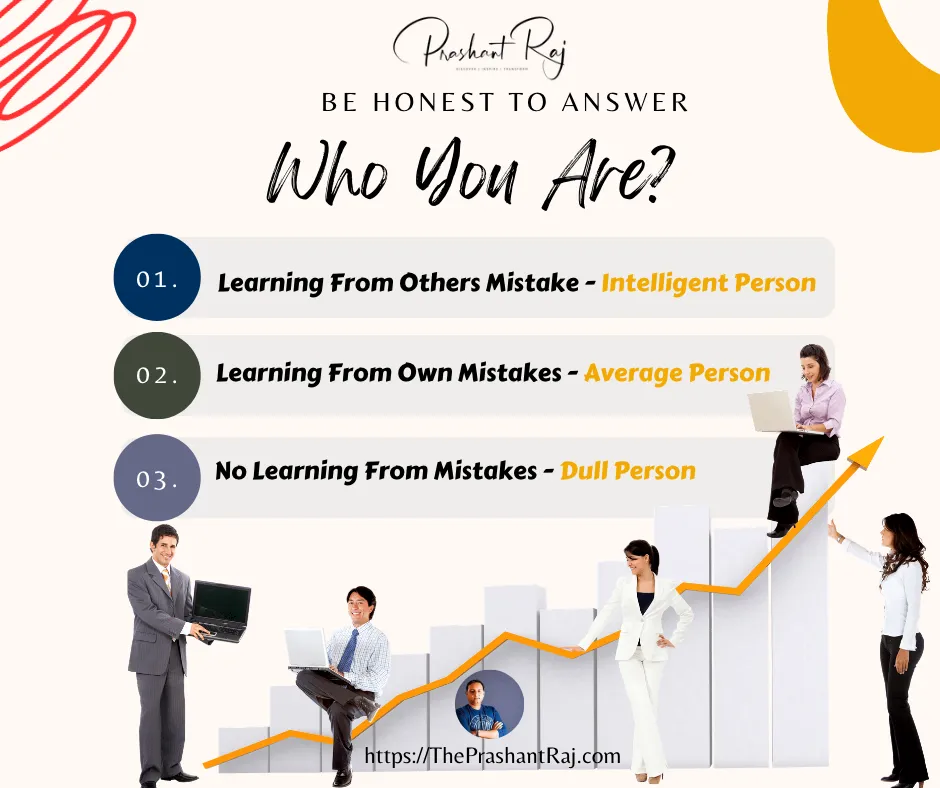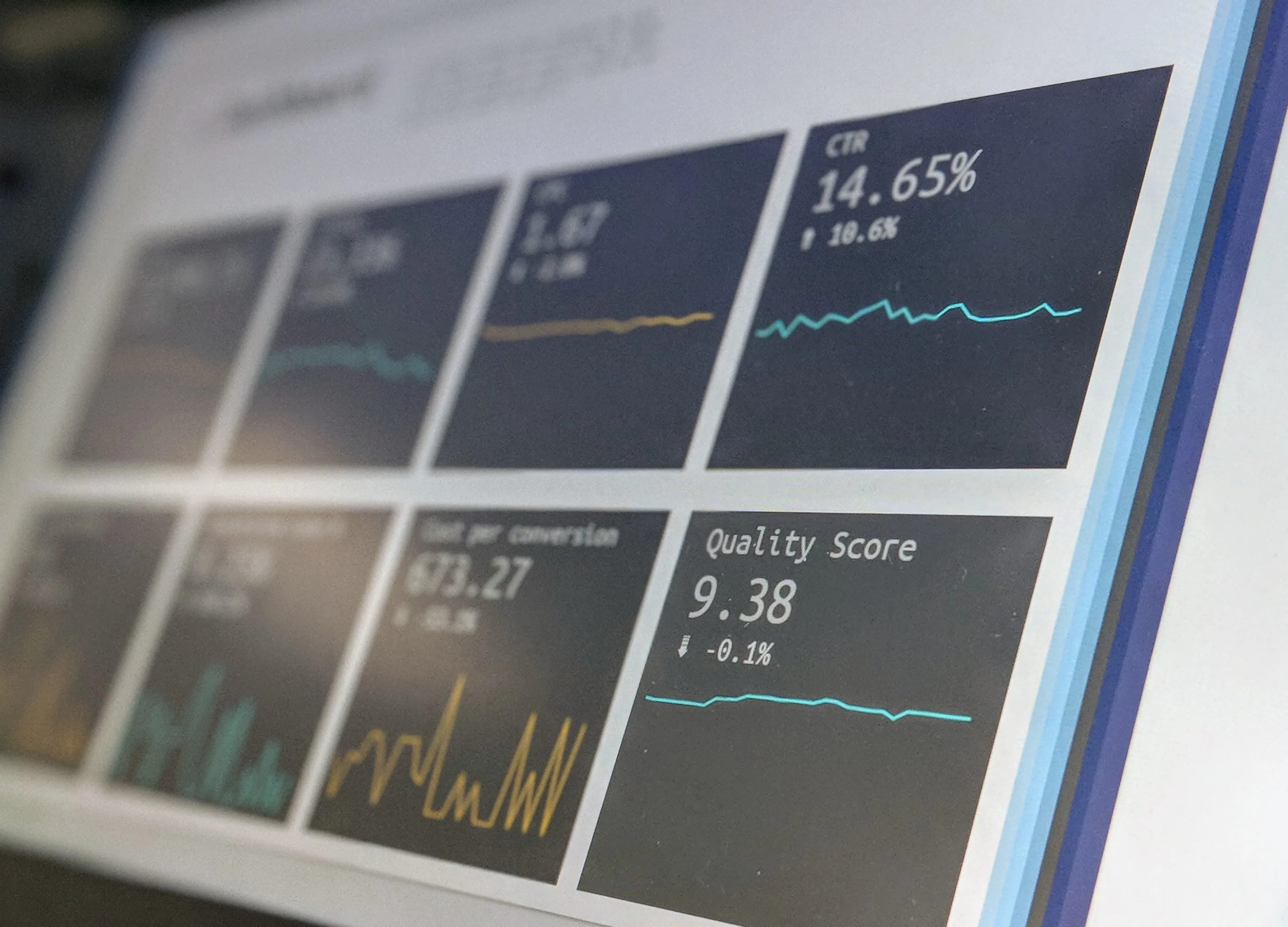Problem & Your Personality
Learning from mistakes, whether they are our own or those of others, is an important aspect of personal growth and development. Here's how you can effectively deal with and learn from mistakes:

1. Learning from others' mistakes:
1.1. Be observant: Pay attention to the experiences and outcomes of others. Observe their actions, decisions, and the consequences they face.
1.2. Analyze the mistakes: Examine the mistakes made by others and try to understand the reasons behind them. Look for patterns or common pitfalls.
1.3. Extract lessons: Identify the lessons you can learn from these mistakes. Consider how you can avoid making similar errors in your own life or endeavors.
1.4. Apply the lessons: Implement the lessons learned into your own decision-making processes. Make conscious efforts to avoid repeating the same mistakes.
2. Learning from your own mistakes:
2.1. Acknowledge the mistake: Accept that you have made a mistake and take responsibility for it. Avoid blaming others or making excuses.
2.2. Reflect on the mistake: Analyze the circumstances that led to the mistake. Identify the factors that contributed to the error.
2.3. Understand the consequences: Evaluate the impact of your mistake. Recognize the negative outcomes and how they affect you and others.
2.4. Extract lessons: Reflect on the lessons you can learn from your mistake. Consider what you could have done differently and how you can avoid similar errors in the future.
2.5. Apply the lessons: Use the insights gained to modify your behavior, decision-making process, or approach. Implement changes that will help you grow and prevent the repetition of the same mistake.
3. Not learning from mistakes:
3.1. Be open to feedback: Accept constructive criticism from others and be willing to evaluate your own actions and decisions objectively.
3.2. Seek self-awareness: Reflect on your actions and the consequences they bring. Be honest with yourself about areas where improvement is needed.
3.3. Take responsibility: Recognize that mistakes happen, but it is essential to take responsibility for your own growth and learning.
3.4. Embrace a growth mindset: Adopt a mindset that sees mistakes as opportunities for learning and growth. Embrace challenges and view setbacks as stepping stones toward improvement.
Remember, learning from mistakes is a continuous process. It requires self-reflection, a willingness to change, and the determination to grow as an individual. By being open to learning from both your own mistakes and the mistakes of others, you can enhance your decision-making skills and achieve personal development.

How problem is the solution of most of the successes in the world?
Problems are often the catalysts for most successes in the world. They present opportunities for innovation, growth, and improvement. Here's why problem-solving is crucial and how it contributes to success:
1. Identifying opportunities: Problems highlight areas where there is a need for a solution or improvement. By recognizing and understanding these problems, individuals can identify opportunities to create products, services, or innovations that address specific challenges. Successful individuals and organizations often find success by providing solutions to existing problems.
2. Driving innovation: Problems inspire creative thinking and innovation. When faced with a problem, individuals are motivated to think outside the box, explore new ideas, and come up with unique solutions. The process of problem-solving often leads to breakthroughs, advancements, and inventions that can revolutionize industries and contribute to success.
3. Meeting customer needs: Problems are often associated with unmet needs or dissatisfaction among consumers. By addressing these problems, individuals and businesses can provide solutions that meet the needs and preferences of their target audience. Understanding and solving customer problems is crucial for building successful products, services, or businesses.
4. Overcoming challenges: Success rarely comes without facing challenges along the way. Problems provide opportunities to develop resilience, determination, and problem-solving skills. Overcoming obstacles strengthens individuals' abilities to persevere, adapt, and find solutions. The experience of solving problems and overcoming challenges contributes to personal growth and success in various areas of life.
5. Continuous improvement: Problems act as feedback mechanisms, highlighting areas that require improvement. Embracing problem-solving as an ongoing process allows individuals and organizations to continuously refine their strategies, products, or services. The ability to identify and address problems helps maintain competitiveness, efficiency, and relevance, leading to long-term success.
6. Building expertise and reputation: Successfully solving complex problems builds expertise and credibility. Individuals who consistently demonstrate problem-solving skills gain a reputation for being reliable, resourceful, and knowledgeable. This reputation attracts opportunities, collaborations, and recognition, which can further contribute to success.
Please let me know if you have any comments.
Connect to get 45 min free consultation: Book An Appointment
Join: Telegram, Facebook, Twitter, LinkedIn, Instagram, Spotify
Thank You


